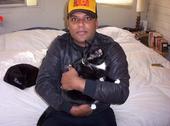..Jessel was born in St. Vincent West Indies and was raised in Canada, NY and NJ. Most of his melancholy can be attributed to the moment in the fifth grade when he proudly presented his mother with new and improved lyrics for "the Sound of Silence." She would have been happy and proud but in addition to rewriting songs at an early age he was no longer telling the relatives he wanted to be a brain surgeon. Many years later while attending various colleges in search of the perfect woman he published his first poem while releasing his first CD with the rock band Monkey Engine. He decided to quit college because he enjoyed being a starving artist infinitely more than life in academia. Monkey Engine released the CD Squared Away and opened for many national acts but split up after reaching the regional level. This led to a deep "national depression" for the artist. (National depression is when you drift around the country under the guise of being a wondering soul when in fact you're just bummed out you can't cut a record deal)
In the mid nineties, the new resurgence of country rock began to take root. Bands like Uncle tupelo and The Jayhawks had a passionate audience in Springfield long before their popularity grew nationally. These "new" influences combined with the folk and classic rock influences of his delinquent adolescence began to take root. He quickly drew a passionate following in Springfield and decided it was time to take things to the big Apple with his new EP 'Death poems to the gods of America'. That year and a half was spent playing in the subway, gigging in various East village jaunts and subsisting on 211 malt liquor and pork fried rice. At the tail end of the NYC stint he parlayed a deal with producer Eric Ambel (Joan Jett, Ryan Adams, Steve Earle). The songs from those sessions, along with his solo material, move effortlessly between roots rock, folk, garage and classic rock.
Disjointed characters living on the fringe form the lyrical foundation for songs that are the obvious result of reading way too much Raymond Carver, Thom Jones, Larry Brown and Charles Bukowski.
In 2003 he moved back to MO and enthusiastically upgraded his diet to PBR and Beef Lo Mein while releasing two Cd's locally.
Chicago has become his present home base and the word on the street is he's hunkered down.
While the prospect of wordly success appears to be drawing nigh from The herculean efforts of The Western Paradise, the artist has become increasingly obsessed with pondering if he will remain a quasi blue collar plebeian or become a hackneyed elitist trafficker.
"Post-modern troubador, gritty storyteller, rock-and-roll songwriter, and unflinching poet, Jessel Harry is a
musician and writer that blends Bukowski and the bible with his personal experiences and social observations
into moving, gutsy commentary."
Present Magazine, KC MO
"Moody, Intense and Immediate, the five songs on 'Industry' weaves together harry's vision of the American West as desolate and at times threatening...the macho loner cowboy mindset once viewed as the archetype for the American male is now alone and grasping for meaning in the 21st century"
Go Magazine, Springfield MO
"What's Next in 2007: The Western Paradise.
After releasing the concept EP Industry in October, we were anxiously awaiting a full-length album to really see what singer-songwriter Jessel Harry could do. We were promised two albums, in fact, neither of which arrived yet. When they arrive, though, we'll be waiting."
GO Magazine, Springfield MO
